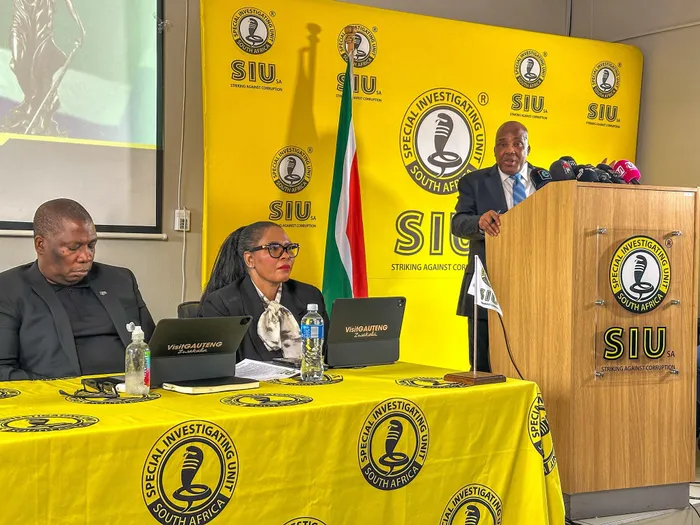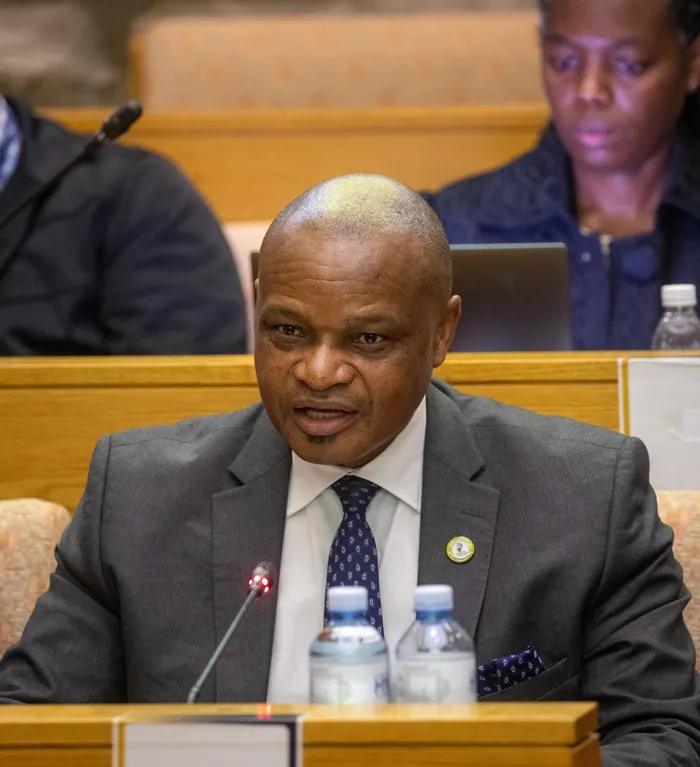
Gauteng Health MEC for Health, Nomantu Nkomo-Ralehoko has revealed that the department has acted against some of the officials involved in alleged corruption at Tembisa Hospital.
Image: Gauteng Health
The Special Investigating Unit (SIU) has revealed a disturbing pattern of corruption and maladministration at Tembisa Provincial Tertiary Hospital in Gauteng, where syndicates collaborated with Department of Health officials to embezzle public funds.
The findings, outlined in an interim report presented on Monday, have sent shockwaves through the health sector, highlighting the urgent need for accountability and reform.
During a press briefing, SIU head Advocate Andy Mothibi, accompanied by Minister of Health Dr Aaron Motsoaledi, Gauteng Premier Panyaza Lesufi, and Gauteng MEC for Health Nomantu Nkomo-Ralehoko, detailed the extensive investigations that uncovered alarming levels of looting at the facility.
Mothibi described how three syndicates worked closely with hospital officials.
“We have of course uncovered extensive corruption. The investigation reveals a pattern of corruption by officials and service providers significantly undermining the intended purpose of allocated funds,” he said.
He explained that a sound procurement process typically includes a purchase request form, fair vendor selection, and adherence to central supplier database guidelines.

Special Investigating Unit head Andy Mothibi
Image: File
“However, the SIU found that these protocols were circumvented, allowing for further irregularities and concealment of supplier identities. The SIU findings indicate severe breaches of trust and authority within the department and Tembisa Hospital’s operations, including fronting and syndicated activities,” said Mothibi.
Ordinarily, the procurement process begins with a purchase request form, which outlines the available budget, required items, and estimated unit prices. The form must be signed by the end-user and authorised by the chief executive officer.
Once in the supply chain management (SCM) system, the form is processed through the distribution of RFQs, evaluation, adjudication, and recommendation of selected service providers. Each bid must include quotations, relevant Companies and Intellectual Property Commission (CIPC) documents, and director identifications, among other requirements.
“In this investigation, most of what was submitted was fraudulent. This is what the investigation picked up,” said Mothibi.
He said the rot ran deeper, including manipulation of losing bids.
“In any procurement process, there would be losers, the unsuccessful bidders. Evidence and our investigators uncovered that the unsuccessful bidders were also part of this scheme. They would have been requested to submit quotations through these syndicates, and they already knew that they were not going to get it (the tender),” said Mothibi.
“When they don’t get it, they get paid. The SIU identified various links between the winning bidders and the unsuccessful bidders through electronic money transfers, shared directorships and collusion amongst family members etc.”
The SIU traced at least R1 million in payments directly or indirectly made on behalf of successful bidders or syndicate members to unsuccessful bidders who had only pretended to compete in the tender process.
“The CEO of Tembisa Hospital at the time authorised the appointment of non-compliant bidders, raising questions about the lack of oversight from the previous CEO’s office given the frequent approvals of requests for quotations. Tembisa Hospital SCM officials requested purchase orders for these non-compliant bidders from the Gauteng Department Health, the head office, yet no concerns were raised regarding the unusually high number of POs (purchase orders) processed,” said Mothibi.
He added that non-compliant bidders were also issued compliance certificates by the Gauteng Department of Health without red flags being raised.
Earlier, Mothibi said the investigation exposed widespread irregularities.
“This indeed will be described as a devastating plunder of the public funds, which we found in our probe. The investigation has uncovered, up to date, three coordinated syndicates responsible for the loss of over R2 billion," said Mothibi.
He said when the investigation began, initiated by the Gauteng premier's office in 2022, around R850 million was initially believed to have vanished.
"This staggering sum of money intended for the provision of healthcare at Tembisa Hospital to take care of the most vulnerable was instead ruthlessly siphoned off through a complex web of fraud and corruption representing an egregious betrayal of the public trust," said Mothibi.
jonisayi.maromo@iol.co.za
IOL News